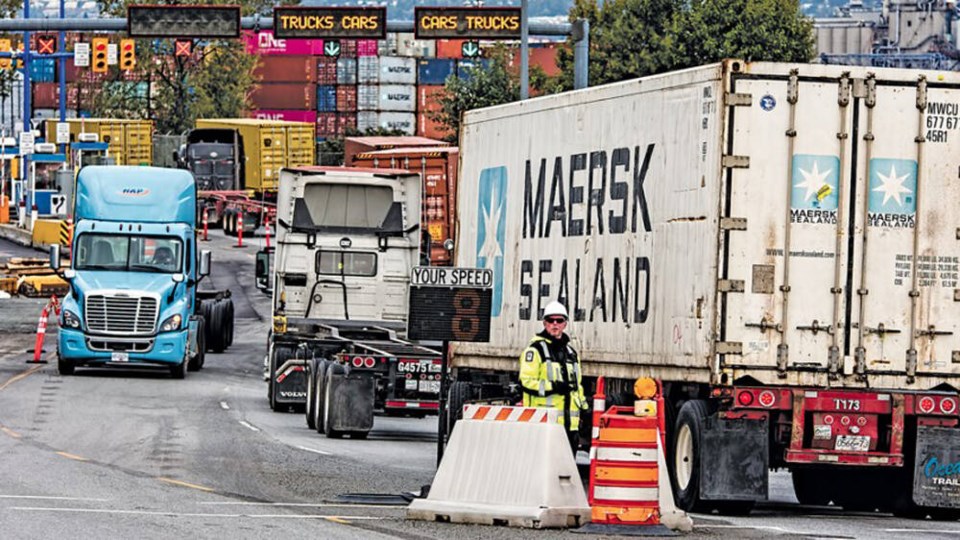The province is kicking in $4 million for a project to help ween B.C.’s port industries off carbon by introducing hydrogen fuel-cell powered trucks.
Minister of Energy, Mines and Low Carbon Innovation Josie Osborne announced the funding on Tuesday, part of a goal to see reduce greenhouse gas emissions by 110 kilotonnes per year through the project.
“We’re working to reduce emissions in B.C.’s commercial transport sector, which accounts for about 60 per cent of transport emissions and 25 per cent of total provincial emissions,” she said said. “Hydrogen will be essential in helping B.C. make the transition to cleaner energy solutions as we work toward meeting legislated greenhouse gas reduction targets.”
The money will largely go to the first fleet of hydrogen trucks to operate around Delta Port. Four yard trucks will be put to work at the BC Ferries terminal and Tidewater Container Services’ facility. One of two drayage trucks will be used to haul shipping containers by Harbourlink from Delta Port to a distribution centre. The other will be used by HTEC to move hydrogen from its Metro Vancouver production plants to the growing network of filling stations around B.C.
“We want to show the operators … that this is a viable technology, that it meets the needs of the fleet operators and can do the job and that there’s an available source of zero-emission equipment out there,” Jeff Grant, vice-president of transportation solutions for HTEC, the North Vancouver-based hydrogen firm leading the project.
Hydrogen trucks
The trucks will be prototypes outfitted with fuel-cell engines, electric drives and hydrogen storage tanks, designed and assembled by Kelowna’s Hexagon Purus. The first two vehicles are expected to arrive by the end of the year with remaining four coming in 2024. They will be kept fueled via a hydrogen pump HTEC is installing at an existing filling station on Tsawwassen First Nation.
HTEC is currently building an electrolyzer plant in Burnaby capable of producing one tonne of hydrogen fuel per day. They are also seeking to build an even larger one attached to an existing chemical plant in North Vancouver capable of producing 15 tonnes per day – enough to power about 30,000 vehicles. Both plants will be powered by BC Hydro’s grid, which is largely run on hydroelectric energy, making the “well-to-wheel” carbon intensity very low, Grant said.
“It’s going to be a marked difference compared to diesel operation – north of a 75-per-cent improvement in terms of emissions,” he said.
Unlike consumer vehicles, so far, there has been no zero-emission vehicle mandate announced for the trucking industry but Grant said it’s likely something that will come in the future.
While battery electric vehicles have become wildly popular with consumers, the technology isn’t yet suited for heavy trucks, Grant said.
“The biggest advantage with hydrogen is energy density. You can store more energy on board than you can with a battery electric truck so you’re generally able to meet the normal working conditions and duty cycle of that diesel equipment,” he said. “There’s a lot of interest and a lot of movement for fuel-cell versions, because there’s no compromise to the performance, the filling times are quick, and you don’t have to reduce payloads.”
Industry reacts
Dave Earle, president and CEO of the British Columbia Trucking Association, said he is thrilled to see the government spurring some innovation in the industry.
“What’s really important to recognize is this is a very, very important step,” he said. “We can learn what works, what doesn’t, what are the limitations, what are the successes?”
Earl said there is definitely a consensus among the industry – and enthusiasm – to transition off diesel but he warned the technology and availability of low-carbon trucks is nowhere close to making wide-scale adoption something that can happens soon.
Today, about 18 per cent of new consumer vehicle sales are zero-emission models but that took a decade to reach that point, he noted.
A lot of research is happening into different low-carbon energy sources, each of which will likely play a role in the long-term decarbonization of trucking, Grant added.
“Every manufacturer is spending literally billions of dollars to bring this technology to market but there is nothing available for delivery today,” he said. “I know everybody wants to have this happen, and nobody more than us and our members wants to make this transition happen as quickly as we can. The cold, hard truth is it’s going to take a long time.”




